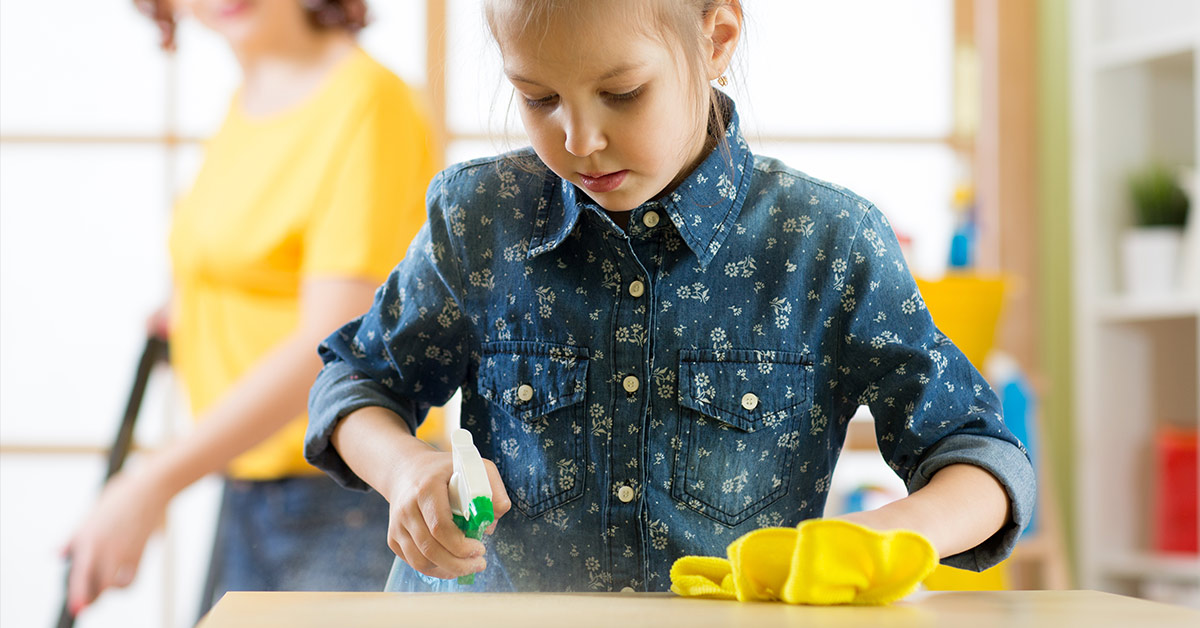They’ll sulk and drag their feet now, but in the future when they become levelheaded goal-getters who believe in rolling up one’s sleeves and getting things done, they’ll have you to thank for it. And honestly, they were probably kids who do chores when they were younger. Most millennials grew up having responsibilities at home, which was why the conversation about kids and chores didn’t float around a lot in the ‘90s and early 2000s. However, it’s different for the younger generation as parents tend to over-protect and indulge their kids. Hey, not judging here, just stating facts.
Many people insist that childhood is a time to enjoy a responsibility-free life in anticipation of adulthood, and so giving a child chores would be “robbing them” of some sort of mental privilege. This assumption is flawed because adulthood needs to be prepared for, and it doesn’t get covered within a year or two. Little chores such as washing the dishes, vacuuming a room, doing grocery runs, or even something as little as closing a window at a specified time are responsibilities that help shape kids into better individuals. [1] Science has severally proven that if you want your kids to grow into successful, far-reaching adults, then chores are a necessity in your home.
Kids who do chores have stable work ethic
According to the ground-breaking Harvard Grant Study, a 75-year longitudinal study that started in 1938, the two major things people need to live a healthy, happy, and successful lives are love and work ethic. [2] While love comes from self-appreciation and external affection, work ethic comes from the responsibilities that people take on during an impressionable phase of their lives.
“The Harvard Grant Study [finds] that professional success in life…comes from having done chores as a kid,” says former Dean of Freshmen at Stanford University, Julie Lythcott-Haims, at the 2016 TED talk. Also the author of How to Raise an Adult, Lythcott-Haims believes that chores eliminate the need for parents to over-direct or overprotect their kids. “And the earlier you start it the better…If kids aren’t doing the dishes, it means someone else is doing that for them. And so they’re absolved of not only the work, but of learning that work has to be done and that each one of us must contribute for the betterment of the whole.“
Lythcott-Haims recommends that parents start by redefining their one-directional ideas of success. There’s more to life than graduating as valedictorian, getting a scholarship to a reputable college, making the best grades, and securing a great job. Success is relative, not stone-carved. Not every kid would want to trail the path their parents have envisioned for them, but they are more likely to succeed and thrive if they have the support and encouragement of those whose opinions they hold dear.
Read: This Chart Shows You Which Chores Are Age-Appropriate For Your Kids
Roll up and get it done
Parents can also stop enrolling their kids in every activity, believing these engagements would shape them into goal-oriented individuals. Of course, lots of them are helpful, but excessive extra-curricular activities could override the whole point of grooming a child.
Instead, incorporating small chores into their schedules directly teaches a strong mentality: if you need something, get down and work for it. Kids know they’d get in trouble or be denied certain privileges if they don’t take their chores seriously. To retain access to these things, they’d get serious and get their chores done. Although some kids may genuinely want to help out their parents, many just want to be trouble-free.
In the end, it doesn’t matter what their motivations are. Children who are not afraid of responsibilities from that young age would grow up with the courage and drive reminiscent of extremely successful people.
Getting kids to do chores is difficult, but it’s a milestone in great parenting when you get to a point where they do what they are told without dragging their feet or acting upset.
Finally, parents must also learn to find a balance in the entire mix. Kids still have to be kids, so don’t go overloading them with chores and responsibilities in the hopes of raising successful individuals. They’d just end up tired all the time, unable to focus, and possibly dysfunctional.
However, chores are a great upbringing tool, because, as Lythcott-Haims said to Tech Insider: “By making them do chores — taking out the garbage, doing their own laundry — they realize I have to do the work of life in order to be part of life. It’s not just about me and what I need in this moment.”
Keep Reading: Housework Woes: Simply Having a Husband Creates 7 Hours of Chores
Sources
- ” Kids Who Do Chores Are More Successful Adults.” Inc. Bill Murphy. Retrieved August 28, 2020.
- “Want to Be Truly Happy? Here’s the Only Thing Harvard Researchers Say You Absolutely Need.” Inc. Bill Murphy. Retrieved August 28, 2020.
- “Harvard study, almost 80 years old, has proved that embracing community helps us live longer, and be happier.“ Harvard News. Retrieved August 28, 2020.
- “The single best thing parents can do to make sure their kids are successful.” Tech Insider. Chris Weller. Retrieved August 28, 2020.

